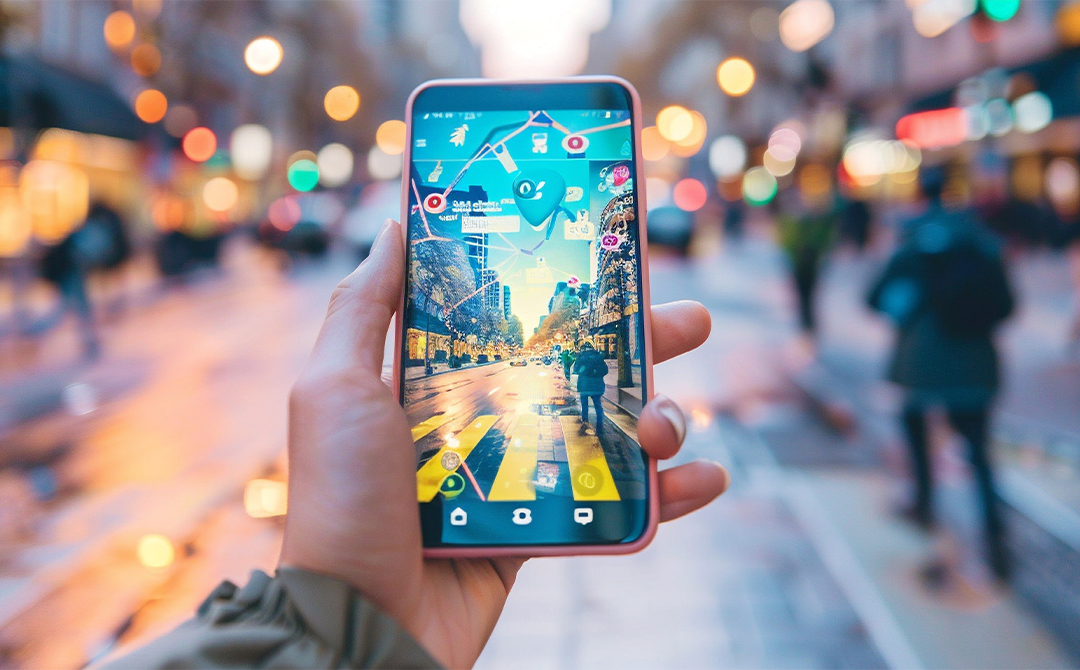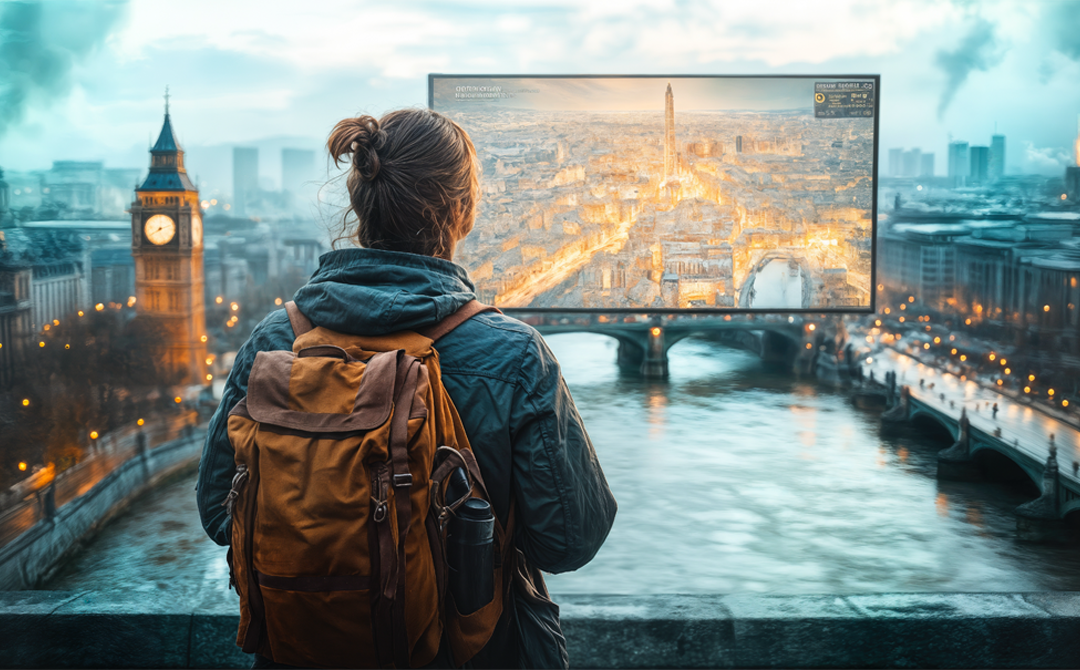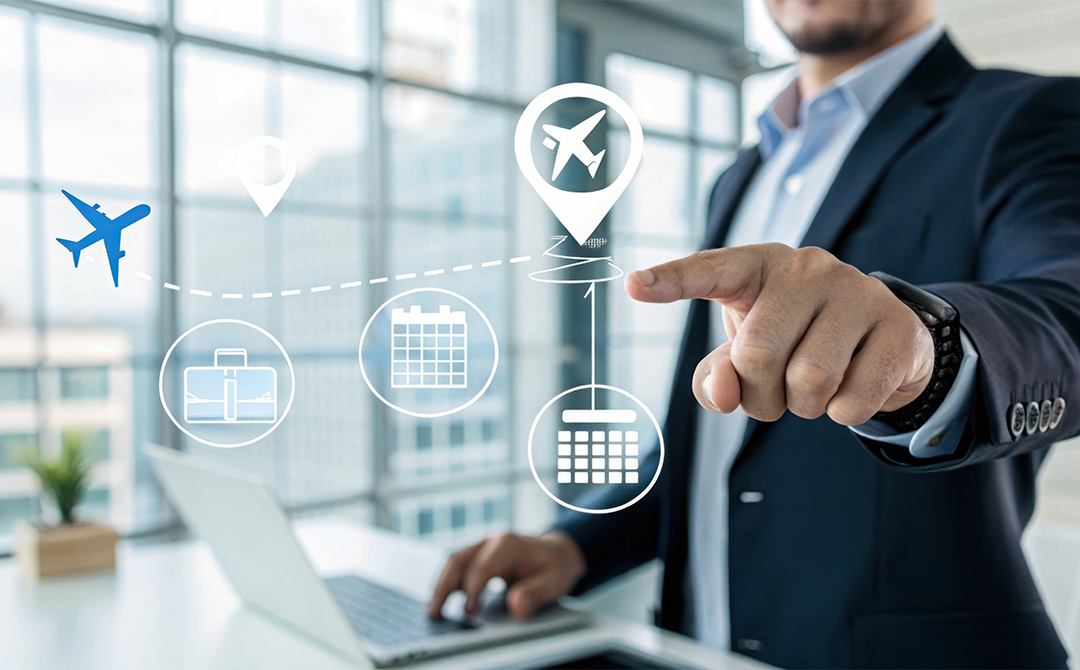
Planning a trip once meant spending hours juggling multiple tabs—booking flights on one site and hotels on another, reading reviews, checking weather and visa rules, and monitoring last-minute alerts across platforms.
Today, AI agents for travel simplify this planning by handling everything from flight and hotel booking to weather and visa alerts based on your preferences and budget. Unlike traditional tools limited to scripted chatbot replies, they offer real-time, personalized support, making travel efficient, seamless, and stress-free.
A 2024 survey by Boston Consulting Group found that four-fifths of consumers worldwide are comfortable with personalized experiences, and most expect companies to offer them.
Today’s tech-savvy travelers demand more than just convenience; they expect personalized, real-time, and proactive assistance, leaving traditional online travel agencies (OTAs) struggling to keep up.
That is where AI agents for travel come in. These advanced systems go beyond static chatbot interfaces to serve as intelligent digital companions that adapt, plan, and respond just like a human travel consultant only faster, smarter, and available 24/7. (Source: Boston Consulting Group)
In this blog, we explore what makes an AI agent ideal for travel, spotlight some of the best AI travel agents in the market, and uncover their future potential to redefine how we explore the world.
Understanding the Qualities of the Right AI Agent for Travel
AI agents vary significantly, particularly in their ability to deal with the complexities of travel. Integrating AI into travel services defies mere automation; it aims to enrich consumer experiences, addressing issues such as last-minute flight alterations and local language quirks.
According to Statista, 69 percent of travel industry respondents reported using AI for customer support, highlighting the technology's role in improving service efficiency. It must blend context awareness, personalization, and multi-system connectivity to deliver a truly elevated travel experience. (Source: Statista)
Here are the essential qualities that define a high-performing AI agent for travel:
- Contextual Intelligence: A travel AI agent must understand and respond based on the traveler’s current status, be it pre-departure, in-transit, or during a disruption. This enables timely actions such as rebooking a canceled flight or arranging alternative transportation, without manual intervention.
- Multi-Modal Communication: Whether via text, voice, or app interfaces, AI agents must engage across multiple channels. Today’s travelers expect seamless support through mobile apps like WhatsApp or even smart assistants, making cross-platform flexibility a necessity.
- Personalization Engine: AI agents should retain knowledge of user preferences, loyalty programs, visa requirements, and travel history for tailored recommendations from business-class upgrades to vegetarian meal preferences.
- Real-Time Data Processing: Travel is dynamic. The best AI agents integrate with live flight APIs, hotel inventories, and weather data to make decisions based on real-time information rather than outdated schedules.
- Autonomous Decision-Making: An AI travel agent should go beyond suggestion-making and handle tasks like booking, rescheduling, and cancelling autonomously, within user-set boundaries, saving time and reducing decision fatigue.
- Scalability and Multilingual Support: For global travelers, language translation and region-specific information (currency, health regulations, local transport) are non-negotiable. Scalable AI agents adapt to different geographies and user volumes without degrading performance.
While these qualities define an ideal AI agent, it is equally important to distinguish how agentic AI stands apart from traditional chatbots, both in capability and the depth of value it brings to the travel experience.
AI Chatbots vs. Agentic AI: What is the Real Difference?
To understand the leap from traditional chatbots to advanced AI agents, it is essential to compare their capabilities:
|
Capability |
Traditional AI Chatbots |
AI Agents |
|
Interaction Style |
Respond to specific keywords or queries with scripted answers |
Understands context and user intent, enabling multi-turn conversations |
|
Personalization |
Offers generic suggestions based on basic inputs |
Builds deeply personalized experiences using behavioral data and past journeys |
|
Task Execution |
Can only perform one task per command (e.g., "Book a hotel") |
Capable of executing multi-step tasks autonomously (e.g., booking + rebooking) |
|
Adaptability |
Struggles with dynamic or unclear inputs |
Learns and adapts based on user behavior, external conditions, and preferences |
|
Context Memory |
No memory of previous interactions |
Retains and applies context across sessions to improve continuity and relevance |
|
Proactivity |
Only reacts to user inputs |
Acts on behalf of the user proactively (e.g., rebook flights during disruptions) |
|
Availability |
May require manual triggers or business-hour support |
Fully autonomous and available 24/7 across platforms |
AI agents for travel represent a paradigm shift from passive support to proactive travel execution. Unlike chatbots that merely respond, these agents think ahead, adapt in real time, and manage entire journeys, delivering a seamless and personalized travel experience that feels almost human.
How AI Agents Revolutionize Travel Experiences
By eliminating friction across the customer journey, AI agents for travel intelligent systems help travelers make smarter decisions, respond faster to changes, and enjoy highly curated experiences.
Let us look at the key ways AI agents are transforming the travel experience:
1. Hyper-Personalised Itinerary Planning: Today’s AI agents analyze user behaviour, preferences, budget, and even social media cues to suggest travel plans that go far beyond one-size-fits-all. Want a pet-friendly beach resort with gluten-free meal options and an on-site yoga class? AI agents can curate that for you, instantly.
2. Proactive Disruption Management: Delays and cancellations are inevitable, but AI agents make them manageable setbacks. By tracking flight APIs and weather alerts in real time, they can rebook flights, notify hotels, and update ground transport often before the traveler is even aware of the issue.
3. Real-Time Visa and Documentation Assistance: Wondering if your passport meets Schengen entry rules or whether a transit visa is required for a layover? AI agents like Amelia and Akira already help with documentation reminders, eligibility checks, and proactive alerts to avoid last-minute surprises.
4. Smart Recommendations Based on Context: AI agents leverage situational data, such as location, time zone, or travel history, to make timely suggestions. If you are arriving late in a city, the AI may recommend late-night restaurants or overnight check-ins without being prompted.
5. Expense and Budget Optimization: Business travelers especially benefit from AI agents that monitor corporate policy compliance, suggest cost-effective options, and automatically generate travel reports, significantly reducing both costs and administrative work.
6. 24/7 Availability with Human-Like Interaction: Unlike traditional travel desks, AI agents offer round-the-clock support with natural language processing (NLP) that makes conversations feel intuitive, enhancing user experience beyond chatbot interactions.
These innovations highlight how agentic AI quietly reshapes the traveler experience from behind the scenes, making journeys faster, smarter, and highly personalized. As adoption continues to grow, businesses that leverage these intelligent systems will set a new standard for convenience, efficiency, and customer satisfaction in the travel industry.
See how enterprise Agentic AI transforms travel experiences end-to-end. Explore Milky Way — built to learn, reason, and scale with your business.
Challenges and Considerations Before Adopting AI Agents in Travel
While agentic AI holds transformative potential for the travel industry, its adoption is not without obstacles. Organizations must understand and carefully navigate the following hurdles for successful integration and long-term benefits:
1. Data Privacy and Trust Concerns: Travelers are increasingly cautious about how their data is used. A study by the National Research Group revealed that 81 percent of travelers prefer to double-check AI-provided information before making decisions, and 51 percent are uneasy about allowing AI access to important travel documents, such as visas and passports. (Source: National Research Group)
2. Integration with Legacy Systems: Many travel companies operate on outdated infrastructure, making it challenging to integrate advanced AI systems. The complexity of aligning new AI technologies with existing booking and operational platforms can hinder smooth implementation and reduce the effectiveness of AI tools.
3. Data Quality and Bias: AI systems rely heavily on the quality of data they are trained on. Poor data quality can lead to inaccurate recommendations, such as suggesting incorrect flight times or inappropriate hotel options. Additionally, biased data can lead to unfair pricing and negatively impact the travel experience.
4. Scalability Issues: As travel companies grow, their AI systems must scale to support the large volumes of users and larger datasets. Designing AI data architectures that are flexible and scalable is a challenge, especially when accommodating real-time processing needs and increased customer interactions.
5. Ethical and Transparency Concerns: The growing influence of AI in personalizing travel experiences brings ethical considerations, particularly regarding privacy, data security, and biases in AI algorithms. Travelers are becoming more concerned about how their data is used and the potential for AI to make biased decisions based on inaccurate or limited datasets.
To fully capitalize on agentic AI, businesses must take a proactive and responsible approach, investing in technology, long-term system resilience, trust, and transparency.
Real-World Use Cases of AI Agents in Travel
AI agents are no longer experimental—they are powering real business transformations across the travel and hospitality ecosystem. Here are some key use cases showcasing their impact:
1. Flight Disruption Management: Airlines and booking platforms are using agentic AI to handle sudden delays, cancellations, and reroutes. Instead of waiting in customer service queues, travelers are automatically rebooked on the next best option, with accommodation updates and car rentals adjusted in real time.
2. Hyper-Personalised Travel for Business Travellers: Platforms like Otto are enabling corporate travelers to set rules, such as booking business class for trips over five hours and prioritizing Marriott properties, and enabling AI agents to make decisions within policy and loyalty guidelines, without requiring human touchpoints.
3. Hotel Guest Services and Upselling: Hotels are deploying multilingual AI agents at the reception and in-room interfaces to autonomously answer queries, offer upgrades, or schedule spa appointments. These systems learn guest preferences during their stay, enabling real-time cross-selling opportunities.
4. Travel Agencies Automating Pre-Sales Engagement: OTAs are using AI agents to analyze user search behavior, recommend real-time packages, and upsell insurance or local guides. Unlike human reps, these agents operate 24/7 and scale instantly during seasonal surges.
Successfully deploying agentic AI solutions requires more than just picking the right platform. It involves integrating these systems with existing infrastructure, training models on contextual data, and ensuring regulatory compliance, all of which fall under expert AI consulting.
Best AI Agents For Travel
The travel industry is undergoing a significant transformation with the integration of agentic AI, autonomous systems capable of planning, adapting, and executing tasks with minimal human intervention. MarketsandMarkets reports that the AI in tourism market is estimated to be worth USD 2.95 billion in 2024 and is projected to reach USD 13.38 billion by 2030, growing at a CAGR of 28.7 percent. Here are some of the leading agentic AI tools making waves in the travel sector: (Source: MarketsandMarkets)
1. GuideGeek by Matador Network
GuideGeek is an AI-powered travel assistant accessible via messaging platforms like Instagram, WhatsApp, and Meta Messenger. It leverages generative AI to provide personalized travel recommendations.
Key Features:
- Customized itineraries based on user preferences.
- Integration with over 1,000 travel-specific data sources, including live flight and hotel information.
- Accessible via popular messaging apps without the need for additional downloads.
Limitations:
- Primarily focused on the planning phase; limited ability to autonomously handle real-time disruptions.
- Relies on messaging platforms, which might not suit all user preferences.
2. Super AI Sunny by HomeToGo
HomeToGo, a vacation rental marketplace, introduced "Super AI Sunny," an AI travel assistant designed to offer personalized vacation rental recommendations using generative AI.
Key Features:
- Personalized vacation rental suggestions based on user preferences.
- Integration with Google Cloud's Vertex AI for enhanced capabilities.
- Features like Smart Reviews and Smart Offer Summaries aid informed decision-making.
- Limitations:
- Primarily focused on vacation rentals; lacks comprehensive travel planning functionality.
- Still in development stages; full capabilities are evolving.
3. Olivia by Trevolution Group
Trevolution Group's in-house AI assistant, Olivia, is designed to enhance customer service and business operations through advanced sentiment analysis and conversational analytics.
Key Features:
- Advanced sentiment analysis to understand customer emotions.
- Conversational analytics for improved customer interactions.
- Integration with Trevolution's travel services for seamless support.
Limitations:
- Designed specifically for Trevolution Group's ecosystem with limited external integrations.
- Autonomous decision-making capabilities are not fully disclosed.
4. HotelPlanner.com's AI Call Handlers
HotelPlanner.com has implemented AI agents that can handle customer service calls, provide hotel recommendations, and process bookings in multiple languages.
Key Features:
- Realistic, two-way conversations in 15 languages.
- Ability to make recommendations, check availability, and process payments.
- Operates 24/7, enhancing customer service efficiency.
Limitations:
- Primarily focused on hotel bookings and does not support end-to-end itinerary planning.
- Complex queries may still require human intervention.
5. TravelAgent AI by Research Collaboration
TravelAgent is a research-driven AI travel planning system powered by large language models (LLMs), designed to provide reasonable, comprehensive, and personalized travel itineraries grounded in dynamic scenarios.
Key Features:
- Tool usage, recommendations, planning, and memory modules for comprehensive planning.
- Evaluated with human and simulated users, demonstrating effectiveness in personalization.
- Focus on rationality, comprehensiveness, and personalization in travel planning.
Limitations:
- Not yet commercially available.Currently, a research project.
- Practical applications in real-world scenarios remain limited.
Future Potential for AI Agents in Travel
As travel becomes a dynamic and real-time experience, the role of AI agents expands far beyond itinerary suggestions and booking assistance. EY Japan reports that about 60 percent of travelers in the Asia-Pacific region are using AI tools to research and book their travel destinations, aiming to reduce booking time and access reliable information. This trend indicates a significant shift towards AI-driven travel planning, where agentic AI becomes a traveler's intuitive, proactive, and increasingly autonomous co-pilot. (Source: EY Japan)
Here is what lies ahead:
1. Fully Autonomous Travel Management: The future AI agent will not just recommend but execute. From securing e-visas to scheduling airport transfers and booking last-minute event tickets, AI agents will manage the entire journey lifecycle, requiring minimal user input.
2. Voice-First, Multimodal Interfaces: With advances in NLP and speech synthesis, AI agents will transition into conversational interfaces that are accessible through smart devices, wearables, or even in-flight screens. Travelers will be able to ask, “Where is the nearest ATM?” or “Can you change my hotel to one with a gym?” and the agent will act immediately.
3. Emotionally Intelligent Travel Companions: Future agents will gauge user sentiment and stress levels based on tone, text, and biometrics to adapt their support accordingly, whether that means calming messages during flight delays or offering last-minute lounge upgrades.
4. Interconnected Agent Ecosystems: We will see AI agents syncing across platforms such as airlines, hospitality, ground transport, and events, creating a unified travel experience. Imagine a single agent coordinating with multiple service providers to ensure a smooth journey, even across borders and systems.
5. Predictive and Preventive Travel: AI will move from reactive to preventive. Predictive analytics will guide decisions around weather patterns, crowd levels, and local regulations to reroute travelers before an issue arises.
6. Sustainability-Centric Travel: As eco-conscious travel becomes a priority, AI agents will incorporate carbon footprint analysis and sustainability scores when suggesting flights, hotels, and local activities, empowering travelers to make greener choices.
As AI agents for travel become more proactive, interconnected, and multimodal, they redefine travel experience, anticipating needs, solving problems in real time, and making smarter and greener choices at every step of the journey.
Conclusion
The travel industry is at the cusp of an intelligent revolution, where AI agents are not just tools but trusted digital companions that empower travelers to navigate the world with ease, speed, and confidence. From simplifying itinerary planning to handling disruptions in real time, agentic AI platforms like GPTBots, GuideGeek, and TripGenie are redefining what travelers can expect from technology.
What sets these AI agents apart is their automation, autonomy, adaptability, and personalization at scale. As these systems continue to evolve, they will become even more integrated into our travel routines, making journeys smarter, safer, and more sustainable.
For travel businesses, now is the time to embrace this AI shift. Early adopters will gain a competitive edge, delivering next-gen experiences that resonate with today’s and tomorrow’s travelers. Partner with Tredence to harness the full power of AI agents and build customer-centric, future-ready travel solutions.
FAQs
1. What is the difference between AI chatbots and AI agents in travel?
AI chatbots are rule-based systems that offer predefined responses to user queries. They typically handle simple tasks like answering FAQs or checking booking statuses. In contrast, AI agents in travel go several steps further; they autonomously plan, execute, and adapt to dynamic scenarios. These agents understand context, manage multi-step travel tasks, and even take proactive actions such as rebooking canceled flights or notifying users of visa issues without user prompts.
2. How do travel companies use AI agents to personalize experiences?
Travel companies leverage AI agents for personalized experiences by analyzing a wide range of user data, such as past bookings, preferences, loyalty programs, budget behavior, and real-time interactions. These insights allow agents to craft tailored itineraries, recommend relevant destinations, and even apply upgrades or discounts automatically. The result is a curated travel experience that feels less like a transaction and more like a concierge-level service.
3. Can AI agents react to travel disruptions in real time?
Yes. Advanced AI travel agents are equipped to monitor live data feeds such as flight statuses, weather alerts, and traffic conditions. When disruptions occur, they instantly evaluate alternatives and autonomously take corrective actions like rebooking flights, adjusting hotel stays, or updating ground transport, all while notifying travelers through their preferred communication channel. This minimizes downtime and delivers a seamless travel experience.

AUTHOR - FOLLOW
Editorial Team
Tredence




